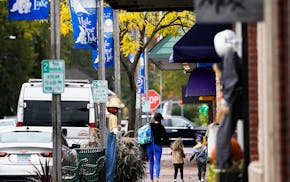Nestor Gomez had been waiting years for a chance to work and live openly without the fear of being deported from the United States, his home since he was 9.
So when President Obama last summer announced a program to grant work visas to eligible young undocumented immigrants, Gomez, 19, wanted to apply right away.
There was just one hitch: the November elections. If Obama lost, would Gomez find himself exposed to deportation?
Now Gomez is at the front of an expected surge in applications for the Deferred Action for Childhood Arrivals (DACA) program.
Hundreds of people in Minnesota have attended information sessions on the new program, but immigration lawyers say many have not followed through with applications because of concern about the election's impact on immigration policy.
Republican candidate Mitt Romney's statements that he would honor the deportation waivers and work visas already granted but would not accept any new applications after his inauguration on Jan. 20, 2013, produced a chilling effect on the program, they say.
Since the election, Bloomington attorney Marit Karbowski already has had four clients decide to apply.
"Clients had expressed concerns regarding Mitt Romney's plans to discontinue the program," she said.
At least 1.7 million people qualify for the deportation relief program, according to the nonpartisan Migration Policy Institute. As of Nov. 15, the federal government has received 308,935 applications and has approved 53,273 nationwide. U.S. Citizenship and Immigration Services, the federal agency handling the applications, has not released state-by-state information as yet.
Last summer, President Obama announced that illegal immigrants who came to the United States as children and who have attended school here would have the chance to stay and receive a work permit for at least two years. The president's action does not offer citizenship or permanent residency.
Under the policy, undocumented immigrants who are under 31 years old will be immune from deportation and will be eligible for renewable, two-year work permits if they qualify. Among the requirements: They must have no criminal record, and they must have come to the United States before they turned 16.
Critics have charged that the president's action was an effort to pander to Latino voters and amounts to "back-door amnesty" for people who entered the country illegally.
Lawyers were split
Marc Prokosch is head of the local chapter of the American Immigration Lawyers Association. He said local immigration lawyers were divided over whether it was best to apply right away or wait to see what happened in the elections.
"I was in the camp of suggesting waiting until after the election," Prokosch said. "It was a low-risk proposition to wait. The risks were substantially higher if the new president was not going to continue the DACA program. Some of these people don't even know their home country. To put them at risk of being deported, even if it's a small risk, it's a substantial harm."
Attorney Salima Khakoo said so far she's submitted about 15 requests for deportation relief under the program. One of her clients is a high school girl from south Minneapolis whose mother had been afraid for her daughter to apply because they weren't sure what was going to happen if Obama was not re-elected, Khakoo said.
"They contacted me after the election and said they were just waiting and are now ready to move forward," said Khakoo, who met with the family on Saturday.
'Where is it leading us to?'
The impact of Latino voters on the 2012 election has been the subject of much discussion among pundits and politicians. A recent study by the Pew Hispanic Center found that Latino voters favored Obama over Romney, 71 percent to 27 percent, according to an analysis of exit polls. Obama's national vote share among Latino voters was the highest seen by a Democratic candidate since President Bill Clinton won 72 percent of the Latino vote in his 1996 re-election campaign.
While Gomez says he's excited about the opportunity to apply for a work permit and the possibility of having a driver's license for the first time, he views the deferred-action program as a Band-Aid trying to cover a larger wound. The real remedy, he argued, is comprehensive immigration reform.
Gomez said he prefers to be called a "dreamer" and not an "undocumented immigrant," explaining that he sees himself and other young people in his situation as different because they were brought to this country when they were children and they didn't decide anything.
"Dreamer" is a reference to the DREAM Act, the blocked legislation that would establish a path toward citizenship for young undocumented immigrants who attend college or join the military.
The Nov. 6 election not only has offered reassurance to young undocumented immigrants, but it also has resurrected the possibility of a national conversation on how to reform the immigration system.
"The takeaways are, number one: that deferred action is safe under this president," said John Keller, executive director of the Immigrant Law Center of Minnesota. "This program's going to continue, probably for several years. The other [takeaway] is: What's after this? This is just a temporary placeholder. Where is it leading us to? That's the bigger conversation."
Allie Shah • 612-673-4488

Shop the curbs for free on 'Trash to Treasure Day' in White Bear Lake

Longtime Uptown boutique closing in May

Meet the Athena Award winners: 103 female athletes honored by their schools

Lacrosse lists: 21 top players and the school that's No. 1 for boys and girls
